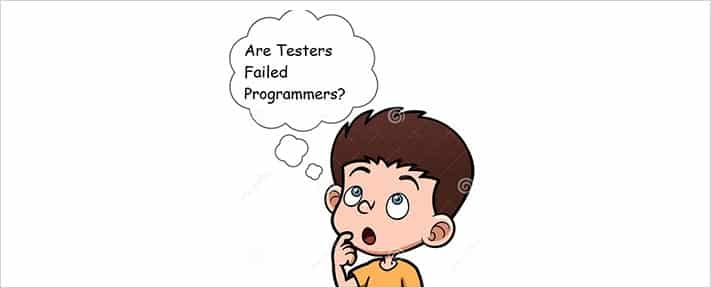Are Testers Failed Programmers?

- June 12, 2014
- admin
Software development is a bit of a thorny process. It involves the role of different individuals and not only fosters collective learning, but also helps in polishing the technical skills of everyone involved. This, however, also gives birth to difference in opinion and professional adversity.
Developers and Tester are two essential cogs in a software development environment, whose interactions often lead to unending squabbling over difference between the job functionalities, job experience, mental attributes and whatnot.
Testers: Second Class Citizens?
The most notable reason is the historical bias against Testers, labeling them as second class citizens and ‘failed’ programmers. “Testers are the computer science grads that can’t code well”. This superiority complex among developers is prevalent in so many software development teams across the world, and is the root cause of the problem.
Of course, this gives birth to high self-esteem often times bordering on over-confidence. They start believing that they always write a bug free code and, therefore, do not welcome the scrutiny and feedback about their handiwork from the QA team.
Hammer & Chisel
The reality, however, could not be any more different. With so much development and advancement in the QA world, the reality is that testers now have a much more challenging and demanding role in the software development funnel. In fact, a testing team is pretty much indispensable in today’s cutting edge software world. Least to say, they are the guardians of the software release and often sits atop the development team.
Let’s take it this way: developers are like doctors who deliver the ‘baby’ (software), and testers are the individuals who say “what an ugly baby”. But that’s not what testers are truly trying to do. Testers are there to help the baby grow up strong. In the end, development and testing are two sides of the same coin. Both complement each other, and that is where both sides need to learn to bench the ego and collaborate.
A Love/Hate Relationship
Over the years, the role of the test/QA professional has evolved into a distinct but equally important role; neither could succeed without the other. Many organizations’ cultures need to evolve to work and thrive with this new demographic. Moreover, the testers should also work not only on identifying bugs, but also to fix minor bugs. Only mailing back the bug reports to the developer asking them to fix bugs over & over will only aggravate the situation and create bad blood. Therefore, it is imperative for both to work collectively on a project as one unit, instead of putting their work on each other’s shoulders.











